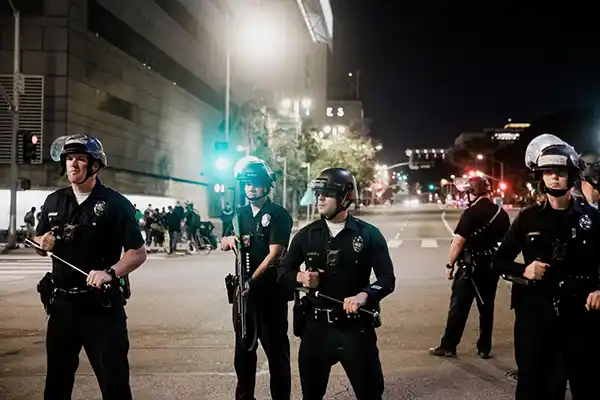
Key Takeaways :
- Excessive force is considered to be a force that is unreasonable or disproportionate, where it may include physical handling, or using a gun or baton.
- Citizens have the right to remain silent to police officers’ inquiries and the right to an attorney.
- Excessive force to make you ‘talk’ is a violation of rights and an arrestable offense. Even if the officer has an arrest warrant, still use of excessive force is not permitted.
- One should stay silent in these situations until they are not assaulted. For proof of misconduct, you may record misconduct. Complaints against such cases against officers can be made.
- An attorney is the best course of action to ensure you do things by the book and to increase the chances of success when filing a lawsuit against law enforcement
Instances of excessive force by police officers have sparked widespread concern and demands for change. It is the use of unnecessary or disproportionate physical force by police officers when dealing with a citizen or group. The result of this can be serious injury, trauma, a violation of rights, and in some cases, death.
As a US citizen, it’s paramount to be informed of your rights and understand how to protect yourself during a police interaction. Although the force does good things every single day, trust in law enforcement cannot be guaranteed until excessive force is a thing of the past.
This guide provides citizens with valuable information about their rights and what to do if they are confronted with excessive force by an officer.

Excessive force (or police brutality) is any force that is deemed unreasonable or disproportionate, but what exactly does this mean? In layman’s terms, this is any physical violence or threat that is not just.
For instance, physically handling someone who has already consented to a search and is remaining calm. Another example may be using a gun or baton even though the citizen is unarmed.
Other common examples include:
Interesting Fact: As per the Fourth Amendment of the U.S. Constitution, “The right of the people to be secure in their persons, houses, papers, and effects, against unreasonable searches and seizures, shall not be violated. Police force falls under the “search and seizure component of the amendment.
One of the most pivotal things for citizens to know during police encounters is their rights. Although the police have a legal obligation to tell anyone they detain about their rights, it can be difficult to remember these in a stressful environment.
All citizens have the right to remain silent and the right to an attorney. This means you can refuse to answer questions until you speak to your attorney, who can guide you through police questioning.
They cannot and should not use excessive force to make you ‘talk’. Although this is often seen in crime shows and movies, it is certainly a huge violation of rights and is an arrestable offense.
Citizens also have the right to be free from unreasonable searches and seizures, meaning the police need probable cause or a search warrant when they want to search you. Again, excessive force cannot, and should never be used, even if they have a search warrant.
In many US states, citizens have the right to record police activity in a public space, as long as this isn’t interfering with their duties. A recording of a police interaction can be invaluable when they use excessive force or misconduct. You also have the right to file a complaint, especially if you’ve been a victim of excessive force.
During a police encounter, it’s imperative to remain calm and respectful, even if the officer is not. Fighting back against excessive force can feel tempting at the time, but unless you feel as though your life is in immediate danger, it’s best to stay silent and wait to make a complaint or file a lawsuit. Although you should never resist an officer, you do have the right to defend yourself in cases you’re being assaulted. This can be by blocking attacks or moving away, but avoiding fighting back.
If you feel as though your rights are being violated, or the situation is escalating for no reason, you should:
After the event, write down everything you can remember, including the location, time, and number of officers, and find out the badge number and name of the officers if you can.
If there are any witnesses, make sure to collect their information and ask for a witness statement with their consent. Depending on where the encounter happened, there may be CCTV cameras to prove your story.
When you are left with any physical injuries, you should seek medical advice. This will ensure that you get the treatment you need, as well as provide you with further documentation of your injuries. It can be used as proof later on when you decide to pursue a court case.
If a police officer has used excessive force against you, or a loved one, or you have been a witness to it, you should file a complaint with the police department.
Not only is this your right, but it allows the officer to be reprimanded for their crimes, understand their wrongdoings, and should prevent the same thing from happening to another citizen.
Contact their internal affairs division or ask for a copy of their civilian complaint review procedures to report the incident to the correct board. You can also ask an attorney to help you with this.
After a complaint is filed, the department has a legal obligation to look into the reported crime or misconduct within a certain number of days (depending on the state and seriousness of the allegation).
Excessive force is never okay if you are resisting arrest or exercising your right to remain silent. An attorney can help you get the compensation you deserve if you have sustained an injury caused by excessive force from police. They can guide you through the process of making a complaint to the correct departments, as well as filing a lawsuit for excessive force and police misconduct.
An attorney is the best course of action to ensure you do things by the book and to increase the chances of success when filing a lawsuit against law enforcement.
They can also provide support during this difficult time, pointing towards therapists and rehabilitation centers if you have been seriously injured or are dealing with post-traumatic stress disorder (PTSD).
These cases can cause all kinds of trauma, both physically and mentally. It can be difficult to go back to work, meaning a loss of income for your family.
Depending on the injury, you may be out of work for a while, or unable to care for yourself. This also causes further financial issues, including prescriptions and hospital bills. An attorney will help you get compensation for all of these losses.
Such cases are something that every citizen should be aware of, but hopefully will never have to deal with. Although these cases are few and far between, excessive force is still a problem for police officers.
When dealing with the officers, know your rights, understand what excessive force is, and know what to do during a police encounter to ensure things go smoothly.
When things don’t go as they should, the most vital steps are to make a complaint and seek legal advice. You should also speak to your doctor or visit the hospital to make a record of your injuries and to check your health.